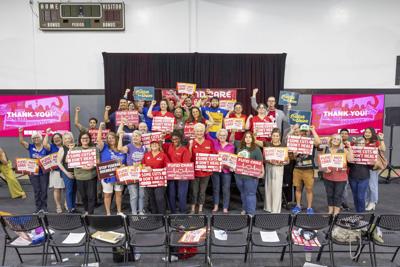MONROE ‚ÄĒ Demonstrators in Monroe will join on Saturday, Sept. 6, in a national day of action on the impact of federal cuts to Medicaid.
The national action is being organized by the Nonviolent Medicaid Army that said in a release it ‚Äúwill mobilize across the country to demand an end to the Medicaid cutoffs currently underway and those coming, and an expansion of healthcare to all.‚ÄĚ
Rallies and speakouts are planned in more than 12 states at various locations ‚Äúselected to publicly expose the impact of Medicaid cuts and the ongoing attacks on healthcare, and provide an entry point for people to get organized,‚ÄĚ the release said.
The event in Monroe is at 2 p.m. on Saturday, Sept. 6. Planned activities include singing, sharing healthcare stories and marching around the historic Courthouse Square which organizers said in the release ‚Äúwill highlight the thousands of people in Wisconsin who do not have access to the healthcare they deserve or who at are at risk of losing their access to healthcare.‚ÄĚ
Medicaid cuts will also result in hospital closures, impacting both rural, suburban, and urban communities while health care companies put profit before people’s lives, said organizers of the national event, which is expected to include actions in Georgia, Indiana, Maryland, Massachusetts, New York, Ohio, Pennsylvania, Wisconsin and Vermont.
The Nonviolent Medicaid Army of the poor ‚Äúis a growing, united and politically independent force of the poor and dispossessed,‚ÄĚ the release said.
The organization said it is united across identities, regions, races and issues.
‚ÄúAs people are removed from Medicaid they will return to unaffordable, marketplace or employer based plans with high-deductibles and copays or no insurance coverage at all. They will struggle to access the care they need and will avoid going to the doctor, skip or ration medications, and decline treatment. This will fuel the crisis of medical debt which totals nearly $200 billion in the U.S. today,‚ÄĚ the release said.
More information on the Sept. 6 event is at wisconsin@poorpeoplescampaign.org
Medicaid cuts
The the National Association of Counties, which held its annual conference the week after Trump signed the bill into law that includes cuts to Medicaid, has pushed senators to delay the start dates for some Medicaid changes, and it hopes that further conversations with lawmakers in Congress can prevent some of them from ever taking hold. At its conference, questions swirled.
‚ÄúWe‚Äôre talking about Medicaid and SNAP ‚ÄĒ these are people‚Äôs lives and livelihoods,‚ÄĚ Ritacco said.
Republicans insist the law is adhering to Trump’s vow not to touch Medicaid as the changes root out waste, fraud and abuse. A memo from the House GOP’s campaign arm encourages lawmakers to focus on the popularity of its new work requirements and restrictions on benefits for certain immigrants.
‚ÄúThose safety nets are meant for a small population of people ‚ÄĒ the elderly, disabled, young pregnant women who are single,‚ÄĚ the House speaker said on ‚ÄúThe Benny Show.‚ÄĚ
He said the years since the Affordable Care Act, or Obamacare, came into law, ‚Äúeverybody got on the wagon.‚ÄĚ
‚ÄúAll these young, able-bodied, young men who don‚Äôt have dependents, riding the wagon,‚ÄĚ the speaker said.
Medicaid then and now
When President Johnson established Medicaid alongside Medicare ‚ÄĒ the health care program for seniors ‚ÄĒ as part of the Social Security Amendments of 1965, it was meant for low-income families as well as the disabled.
And it quickly took off. Almost every state signed on to participate in Medicaid by 1970, according to the KFF, an organization focused on health policy. It soon went beyond covering its core population to include pregnant women, school-age children and not just the very poor but also those with incomes just over the federal poverty limit, which is now about $15,650 annually for a single person and $26,650 for a family of three.
In the 15 years since the Affordable Care Act became law under President Barack Obama, Medicaid has grown substantially as most states opted to join the federal expansion. Some 80 million adults and children are covered.
While the uninsured population has tumbled, the federal costs of providing Medicaid have also grown, to more than $880 billion a year.
‚ÄúThere are a lot of effects Medicaid has on health, but the most stark thing that it does is that it saves lives,‚ÄĚ said Bruce D. Meyer, an economist and public policy professor at the University of Chicago who co-authored a pivotal study assessing the program.
The law‚Äôs changes will certainly save the federal government ‚Äúa substantial amount of money,‚ÄĚ he said, but that will come at ‚Äúsubstantial increases in mortality. And you have to decide what you value more.‚ÄĚ
Democratic Leader Hakeem Jeffries, who delivered the longest speech in House history while trying to stall the bill, said the changes will hurt households and communities nationwide.









